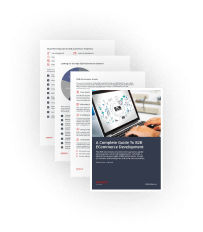We gathered some key marketing approaches that will influence digital technology after their adoption in 2023 and beyond.
#1 Conversational marketing
Conversational marketing is a common feature across the eCommerce industry. It keeps on growing since 2020. It tells that you need to speak first with your audience, and the quicker and more informative your answer is, the more fruitful your communication will be. Conversational marketing is one of the 5 pillars of effective digital marketing nowadays, and is often discussed on webinars and international conferences. In one of those events, a HubSpot rep emphasized the key changes you will need to make to successfully adopt the conversational strategy to your business.
90% of consumers expect an immediate response from a customer service representative.
HubSpot
80% of customers would like to use messaging to communicate with you.
HubSpot
While preparing your conversational marketing to go live, you will need to:
- Define your goal: Why do you want to implement chat? Is it really important? Then, if the answer is positive, include the chat functionality on the pages where it is required.
- Choose a channel to implement chat.
- Incorporate the chat functionality into the existing tech stack of your company.
#2. Marketing personification
Personalization and personification are used interchangeably. Although, these two terms are very close by meaning, they are not the same.
You can personalize your messages and emails while considering your target audience preferences. Personalization in marketing is targeted at an audience segment not at an individual. Gartner prefers to use the term personification, ‘the delivery of relevant digital experiences to individuals based on their inferred membership in a defined customer segment, rather than their personal identity’.
Personification is equal to reverse traceability when targeted people can express their consent about being in your mailing list, for example. Digital marketing moves towards acceptance of consumers as personae, not just audience. When you take your clients as real people and give them a chance to express consent and give feedback, you get a more loyal audience which is eager to engage with you on a mutually beneficial basis. Personalization and personification intersect here with leads and marketing qualified leads. The later options are all about user involvement in the marketing process.
#3. Consumer privacy
Consumer privacy and consent are emerging trends on the marketing scene. One of the biggest steps in advertising during 2020 were the measures taken by Apple, Google and Mozilla to leverage privacy controls for their users. Those measures have the potential to significantly change the way of advertising on Facebook, Google, and other browsers.
Apple is taking away its Apple’s Identifier for Advertisers, IDFAs. It means that when a user opens an app on iOS 14, a prompt will ask: ‘Would you like this application to track you as a user? Without the user consent, performance advertisers won’t be able to track and analyze data. The new IDFA opt-in request is not mandatory until early in 2021.
Cookies on Safari or Firefox or the Brave browser that track information will no longer be maintained. On Safari, cookies expire in just 24 hours. Performance marketers will see less traffic from Safari browsers due to this new rule. Google also reported stopping support of the third-party cookies by 2022. New rules allow for a greater transparence for people. And marketers will have to invent other ways to trigger users and encourage them to share their consent about using their data.
86% of consumers are concerned about their data privacy.
SmarterHQ
At this, Millennials and Gen Z make 47% of consumers who have confidence in brands and are likely to give consent on using data. Baby Boomers and Gen X are less trusting. In this light, it becomes important to explain the value proposition of data collection to reassure consumers about privacy and understand what is valued most.
#4. Marketing automation
Marketing cloud software and email automation are closing widespread adoption. Previously, a majority of email marketing systems were able to make individual newsletter and campaign email broadcasts. Nowadays, a more sophisticated approach is dominating. It is called predictive analytics. Marketers can apply it to identify:
- Optimal time to send letters and better engage an individual (prediction here may depend on the time of purchase or subscription, the time is dynamically refined);
- Best offer to follow up forecasted depending on the average interval of response;
- Best product or best category depending on the cluster-based segments.
#5. Artificial intelligence
Artificial Intelligence (AI) and machine learning (ML) for marketing are getting popular now breaking the wall of distrust. However, many industries are at a low level of maturity in adopting these cutting-edge technologies, as only 10-20% of businesses with skills to deploy them are currently using them.
In this light, it seems rational to gradually involve AI facilities into your business processes depending on their efficiency and your business specifics. As content drives most visitors to your website, you can partially apply AI writers to deliver some pieces of information quicker. AI content writing software can pick elements from a dataset, then structure it for your better perception.
An AI writing program named ‘WordSmith’ generated 1.5 billion pieces of content in 2016, and is expected to grow further in popularity in future. Washington post uses AI software to craft their articles. AI technology has a great potential for reporting on data-focused events such as quarterly earnings reports, sports matches, or market data. It makes sense adopting it if you operate in a similar niche. Then, AI-produced content could become a useful element of your content marketing strategy.
Read more:
Best AI Services For Your ECommerce Business
Closing
No matter what technology you choose to improve the performance of your online platform: connecting MailChimp, integrating with a chatbot or AI-driven Google Shopping ads, choose a reliable partner capable to cover simultaneously all the security issues, technical peculiarity of your chosen shopping cart software with a guaranteed quality assurance.

